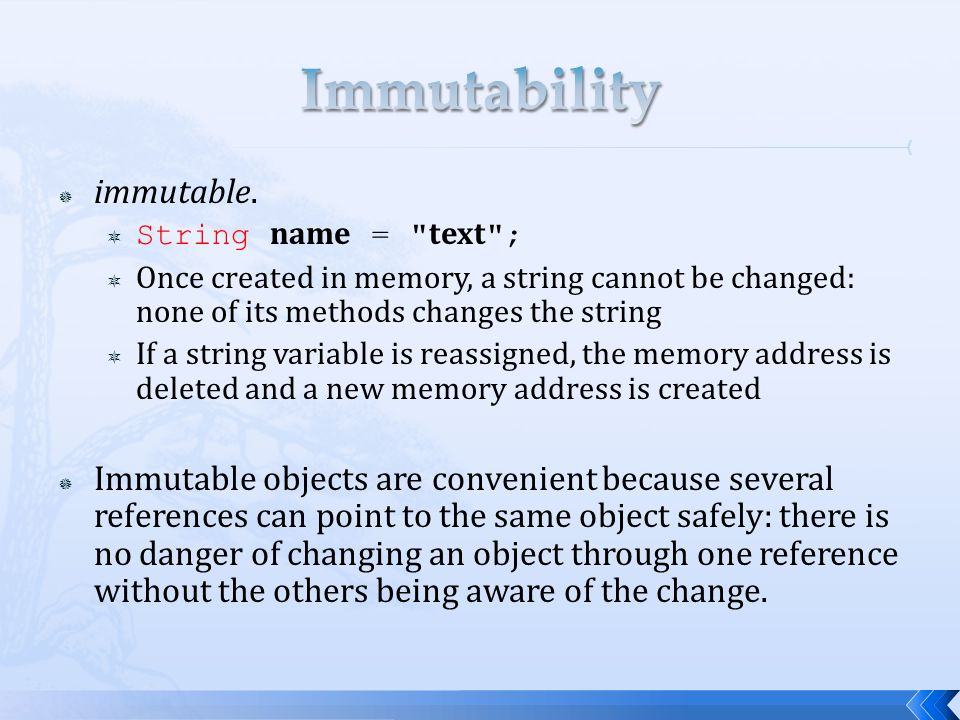Why Are Strings Immutable in Java? Understanding the Core Principles
Why Are Strings Immutable in Java? Understanding the Core Principles
Blog Article
Immutable Strings: A Secret Component in Ensuring Information Consistency and Dependability
In the realm of data monitoring, the value of unalterable strings can not be overemphasized. The concept of immutable strings goes beyond mere technicality; it is a linchpin in the complex web of information governance.
The Idea of Immutable Strings
Immutable strings, a basic idea in programming, describe strings that can not be changed once they are developed. Essentially, when a string value is designated, any type of operation that appears to change the string really creates a brand-new string. This immutability makes certain data consistency and reliability in applications, as it prevents unforeseen modifications to the original data.
Advantages in Information Consistency

Information uniformity is essential in numerous elements of software program growth, including data source management, multi-threaded settings, and dispersed systems (Why are strings immutable in Java?). Immutable strings add dramatically to achieving this consistency by stopping information corruption as a result of simultaneous gain access to. In scenarios where multiple processes or strings communicate with the very same information simultaneously, unalterable strings work as a secure versus race conditions and synchronization concerns
Moreover, the immutability of strings streamlines debugging and testing processes. With immutable strings, programmers can rely on that as soon as a string is established, it will certainly stay unmodified, making it less complicated to map the resource of mistakes and making sure that test cases produce constant outcomes. This reliability in data taking care of eventually causes much more robust and secure applications.

Executing Unalterable Strings
Making sure the immutability of strings needs a thoughtful strategy to their execution in software application advancement. As soon as a string object is produced, one key technique is to develop string courses in a way that prevents modifications. By making strings unalterable, developers can boost data consistency and reliability in their applications.
To execute immutable strings efficiently, designers need to prefer creating brand-new string objects instead of changing existing ones. This practice guarantees that once a string is appointed a worth, it can not be altered. In addition, any type of procedure that appears to customize the string should create a brand-new string with the desired modifications as opposed to changing the initial.
Additionally, utilizing unalterable strings can streamline concurrency monitoring in multi-threaded atmospheres. Because immutable strings can not be transformed after creation, they can be securely shared amongst numerous strings without the danger of data corruption.
Function in Dependability Guarantee
In software advancement, the usage of immutable strings plays an essential duty in making certain the reliability of data procedures. Unalterable strings, once produced, can not be modified, ensuring that the information they stand for remains regular throughout the application's implementation. This immutability residential or commercial property gives a level of assurance that the information being refined will not be unintentionally changed, resulting in unexpected end results or mistakes like this in the system.
By incorporating immutable strings into software program design, designers can boost the reliability of their applications by decreasing the risks connected with mutable data - Why are strings immutable in Java?. Immutable strings help in protecting against information corruption or unexpected modifications, which can be particularly vital when managing sensitive information or when information stability is vital
In addition, the usage of unalterable strings streamlines simultaneous handling, as numerous strings can safely gain access to and share string information without the threat of one string modifying the web content while one more is reading it. This element adds dramatically to the overall integrity of the software system, making certain foreseeable and constant behavior in data handling procedures.
Applications and System Assimilation
The seamless combination of unalterable strings into different applications and systems is crucial for making sure robust data consistency and integrity across varied technical environments - Why are strings immutable in Java?. Immutable strings play look here an essential function in improving the integrity of data exchanges and interactions within complicated software application communities. By incorporating unalterable strings right into applications, designers can alleviate the risks related to data tampering, unauthorized adjustments, and inadvertent alterations, thereby strengthening the overall safety and security stance of the system
In the context of system integration, unalterable strings function as a foundational element for developing safe communication networks and helping with seamless data transfers between different components. Their immutable nature guarantees that data transferred between systems continues to be unmodified and proven, minimizing the likelihood of variances or errors that could compromise the honesty of the entire system. Furthermore, immutable strings can enhance interoperability between diverse systems by giving a standardized style for information representation, enabling extra reliable information processing and exchange procedures throughout interconnected platforms. By embracing immutable strings in applications and system integration processes, organizations can fortify their data facilities and maintain the reliability and uniformity of their information assets.
Conclusion
Finally, unalterable strings play a critical role in maintaining information uniformity and integrity in numerous applications and system integrations. By making certain that strings can not be changed as soon as produced, the honesty of information is maintained, decreasing the risk of errors and variances. Applying unalterable strings can substantially enhance the reliability of systems, eventually leading to even more accurate and dependable data processing.

Report this page